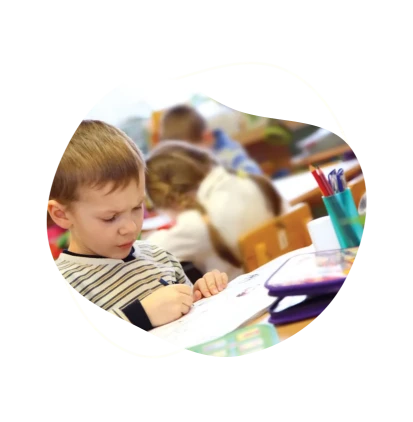Curriculum
Our preschool combines the best of play-based learning and traditional educational methods. Our internationally inspired curriculum, based on extensive research, blends hands-on exploration with structured activities. This balanced approach nurtures each child’s unique development—socially, emotionally, and cognitively—while preparing them for future success. Our custom-designed curriculum also ensures parents have the flexibility to choose where they want to send their children for further education, without compromising a smooth and seamless transition to the next stage.
Key Focus Areas
Our curriculum reflects our commitment to an internally integrated approach that values both academics and play-based learning. By fostering essential skills in a nurturing environment, we ensure that every child can thrive while discovering their unique potential.
Early Literacy and Numeracy
Focuses on introducing letters, numbers, shapes, and patterns in a playful and engaging way. Through interactive activities, children begin to recognize and understand these basic concepts, laying a strong foundation for future reading, writing, and mathematical skills. These early experiences foster a love for learning and help children develop the essential skills needed for academic success.
Language and Communication Skills
Developing language and communication skills involves nurturing listening, speaking, and early literacy abilities. Through songs, rhymes, storytelling, and reading activities, children are introduced to new vocabulary and phonemic awareness. These experiences help them build a strong foundation in language, essential for effective communication and future literacy development.
Health and Safety
Health and safety are emphasized through the teaching of basic hygiene, nutrition, and safety rules. Encouraging healthy habits and personal well-being, these lessons help children understand the importance of taking care of themselves and staying safe in various situations.
Physical Development
Physical development is enhanced by activities that improve fine and gross motor skills. Whether through drawing, cutting, running, or climbing, children develop coordination, control, and overall physical fitness, which are essential for healthy growth and daily functioning.
Cognitive Development
Cognitive development is encouraged through activities that stimulate problem-solving, critical thinking, and exploration. By introducing basic concepts in math, science, and logic, children learn to understand patterns, cause and effect, and other foundational skills that support intellectual growth.
Social and Emotional Development
Fostering social and emotional development involves encouraging children to build relationships, understand emotions, and develop empathy. Through activities that promote self-regulation and cooperation, children learn to interact positively with peers and adults, creating a foundation for healthy emotional growth.
Environment Awareness
Environmental awareness is cultivated by introducing children to the rich natural beauty and diverse ecosystems of Tanzania. Through activities like gardening, recycling, and learning about local animals and plants, children develop a deep understanding of environmental responsibility. By exploring the unique landscapes and wildlife around them, they form a meaningful connection to the natural world, fostering a lifelong commitment to preserving Tanzania’s environment.
Cultural Awareness and Diversity
In our vibrant, multicultural community, cultural awareness and diversity are promoted by introducing children to the various cultures and traditions around them. Through activities that celebrate this rich diversity, children learn to appreciate and respect others, fostering an inclusive environment where all backgrounds are valued and celebrated. This exposure helps them understand the beauty of different perspectives and the importance of unity in a diverse society.
Creative Expression
Creative expression is fostered through art, music, dance, and dramatic play, allowing children to explore their imaginations and express themselves. These activities provide opportunities for children to experiment with different forms of creativity, building confidence and a sense of identity.
Play-Based Learning
Integrating play into all aspects of education makes learning engaging and developmentally appropriate. By encouraging exploration, discovery, and hands-on activities, children learn in a way that is both fun and effective, supporting their overall development.

Programs
Explore our tailored programs, designed to inspire development at every age.
Toddlers
Our Toddler classes provide a nurturing and stimulating environment where young children learn through play and exploration.
Age: 18 Mon-2
Pre-Kindergarten
Between the ages of two and three, children undergo rapid development in thinking, language, movement, and emotional awareness
Age: 2-3
Kindergarten 1
In KG 1, we focus on fostering social, physical, and emotional development.
Age: 3-4
Kindergarten 2
KG 2 provides a more structured learning environment, building on the foundations established in earlier years.
Age: 4-5
Kindergarten 3
The final preschool level, KG 3, builds on the foundational skills developed in earlier years, offering a more advanced and enriching experience.
Age: 5-6
